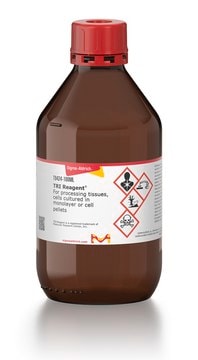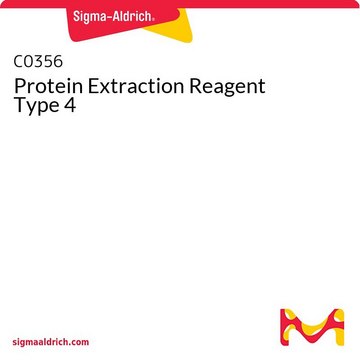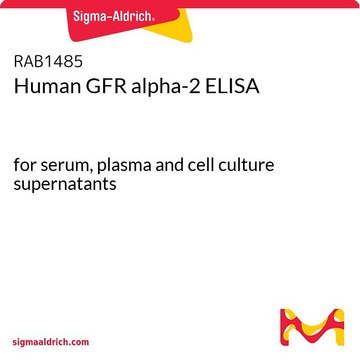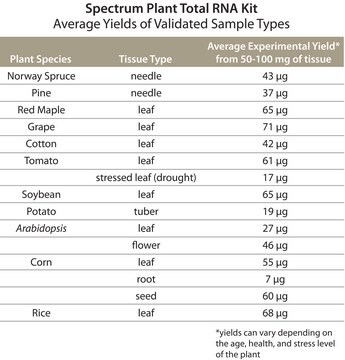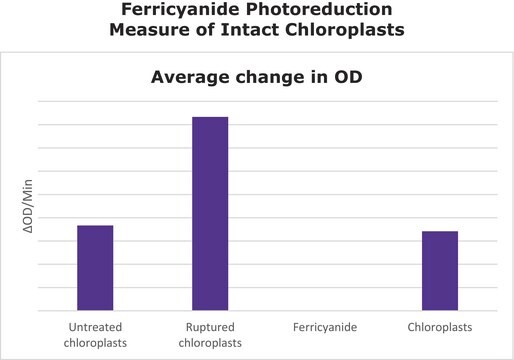PE0230
Plant Total Protein Extraction Kit
Suitable for any plant species or tissue
Synonym(s):
Total Protein Extraction Kit
Sign Into View Organizational & Contract Pricing
All Photos(1)
About This Item
UNSPSC Code:
41105500
NACRES:
NA.56
Recommended Products
technique(s)
protein extraction: suitable
storage temp.
−20°C
Related Categories
General description
The Plant Total Protein Extraction Kit is designed specifically for use in plant bioscience to extract a qualitative sample of all proteins from any type of plant species or tissue. The protocol does not require any ultracentrifugation or aqueous polymer two-phase partitioning (APTP). The kit includes two reagents; a plant specific protease inhibitor cocktail and a new chaotropic reagent with increased solubilizing power to extract more hydrophobic proteins (C0356, Protein Extraction Reagent Type 4). Routine use of the reagent in sequential protein extraction of a plant tissue sample with fresh reagent removes nearly all protein from the tissue. The protease inhibitor cocktail is a mixture of protease inhibitors with broad specificity for the inhibition of serine, cysteine, metalloproteases, aspartic, and aminopeptidases. It contains pepstatin A, 4-(2-aminoethyl)benzenesulfonyl fluoride (AEBSF), E-64, leupeptin, 1,10-phenanthroline, and bestatin. The cocktail has been demonstrated to be highly effective in preventing protein degradation during the extraction process.
Following removal of polyphenolics, tannins, and other interfering substances, ground plant tissue, fresh or frozen, is resuspended in the chaotropic reagent. Plant debris is pelleted by centrifugation and the protein extract is collected. The end result is a qualitative total protein sample, ready for downstream proteomic analysis.
Following removal of polyphenolics, tannins, and other interfering substances, ground plant tissue, fresh or frozen, is resuspended in the chaotropic reagent. Plant debris is pelleted by centrifugation and the protein extract is collected. The end result is a qualitative total protein sample, ready for downstream proteomic analysis.
Application
The plant total Protein Extraction Kit has been used to isolate crude seed protein. It has also been used to extract the total protein.
Quantity
Sufficient for preparation of 20 separate extractions from plant tissue samples of 10-250mg
Signal Word
Warning
Hazard Statements
Precautionary Statements
Hazard Classifications
Acute Tox. 4 Oral - Aquatic Chronic 2 - Carc. 2 - Repr. 2
Storage Class Code
11 - Combustible Solids
Flash Point(F)
185.0 °F - closed cup
Flash Point(C)
85 °C - closed cup
Choose from one of the most recent versions:
Already Own This Product?
Find documentation for the products that you have recently purchased in the Document Library.
Customers Also Viewed
Bioactivity-Guided Isolation of Neuritogenic Factor from the Seeds of the Gac Plant (Momordica cochinchinensis)
Mazzio E, et al.
Evidence-Based Complementary and Alternative Medicine : ECAM, 2018 (2018)
Samuel L Chen et al.
Frontiers in plant science, 10, 1116-1116 (2019-10-15)
Pre-mRNA alternative splicing is a conserved mechanism for eukaryotic cells to leverage existing genetic resources to create a diverse pool of protein products. It is regulated in coordination with other events in RNA metabolism such as transcription, polyadenylation, RNA transport
Revealing proteins associated with symbiotic germination of Gastrodia elata by proteomic analysis
Zeng X, et al.
Botanical studies, 59(1), 8-8 (2018)
Xu Zeng et al.
Botanical studies, 59(1), 8-8 (2018-03-08)
Gastrodia elata, a mycoheterotrophic orchid, is a well-known medicinal herb. In nature, the seed germination of G. elata requires proper fungal association, because of the absence of endosperm. To germinate successfully, G. elata obtains nutrition from mycorrhizal fungi such as
Microscopic and molecular characterization of the prehaustorial resistance against wheat leaf rust (Puccinia triticina) in Einkorn (Triticum monococcum).
Serfling A, et al.
Frontiers in Plant Science, 7, 1668-1668 (2016)
Our team of scientists has experience in all areas of research including Life Science, Material Science, Chemical Synthesis, Chromatography, Analytical and many others.
Contact Technical Service


